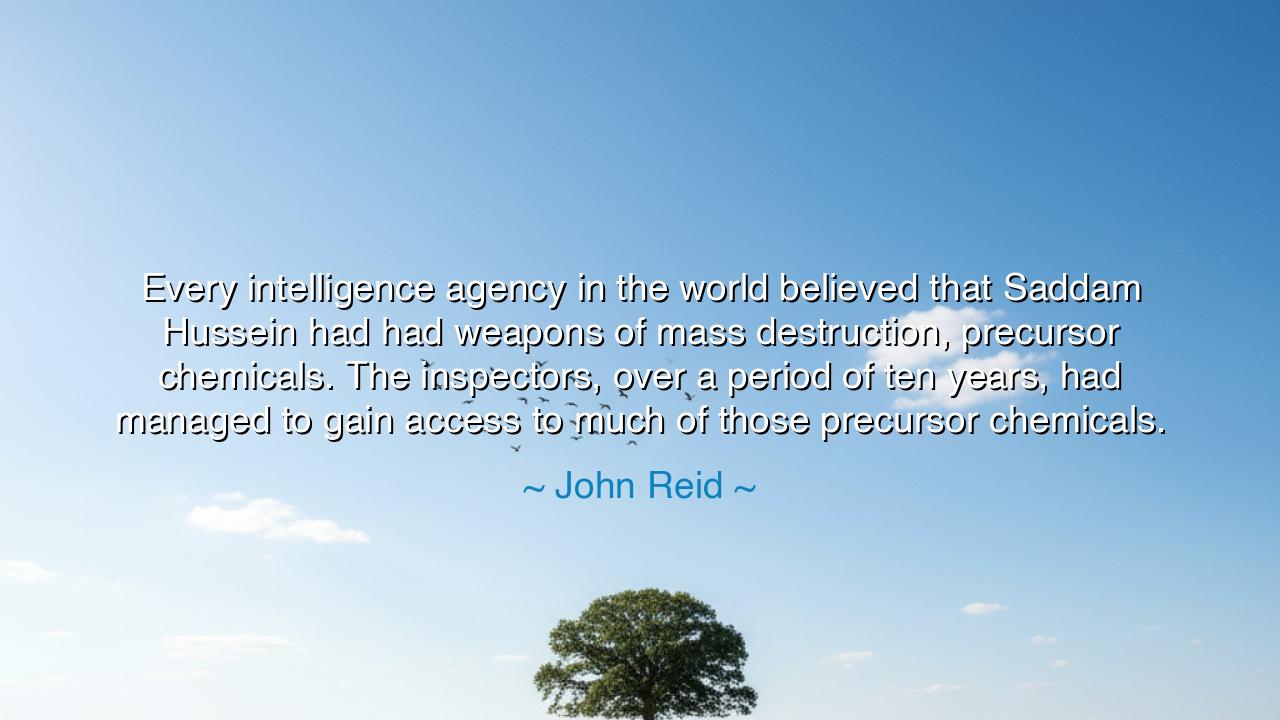
Every intelligence agency in the world believed that Saddam
Every intelligence agency in the world believed that Saddam Hussein had had weapons of mass destruction, precursor chemicals. The inspectors, over a period of ten years, had managed to gain access to much of those precursor chemicals.






The Shadows of Certainty and the Burden of Power
In the chronicles of modern war and human error, few words carry as much weight as those spoken by John Reid, a statesman and defender of his nation, who once declared: “Every intelligence agency in the world believed that Saddam Hussein had had weapons of mass destruction, precursor chemicals. The inspectors, over a period of ten years, had managed to gain access to much of those precursor chemicals.” These words are not only a reflection of political reality but a meditation on one of the oldest truths known to mankind—that even the wisest can be deceived, and that belief, when hardened into certainty, can lead nations astray.
The origin of this quote lies in the early years of the twenty-first century, when fear and uncertainty ruled the hearts of nations. After the terror of September 11, 2001, the world trembled under the shadow of unseen enemies. Rumors of hidden arsenals, of weapons of mass destruction, spread through the corridors of power. Great leaders, moved by duty and fear, placed their trust in the judgments of their intelligence agencies. These agencies, though filled with skilled minds and noble intent, reached a conclusion that would soon shape history: that Saddam Hussein, the ruler of Iraq, held within his grasp the means to unleash destruction beyond measure.
But what John Reid reveals is not merely the recounting of events—it is the tragedy of human certainty. For the belief of many became the error of all. The inspectors, men of diligence and reason, searched for a decade, uncovering traces, fragments, whispers of weapons that once were or might have been. They found precursor chemicals, the ingredients of fear, but not the final proof of doom. Yet by then, momentum had overtaken patience, and the wheel of history turned toward war. It was not malice alone that led to it, but conviction—the conviction that humanity could not afford to doubt.
The ancients, too, knew this peril. In the days of Troy, the Greeks believed beyond question that Helen had been stolen and dishonored. Their certainty ignited a war that lasted ten years and left a generation in ruin. Yet as the poets told, the truth was more complex than men were willing to see. So it is with nations: belief becomes dangerous when it is no longer questioned. The greatest tragedies often arise not from ignorance, but from false knowledge—from the confidence that one’s view of the world is complete and correct.
John Reid’s words thus serve as a mirror for all ages. They remind us that the tools of reason—intelligence, analysis, evidence—are powerful, but not infallible. Even the most enlightened societies can become prisoners of their own assumptions. For every shadow that intelligence illuminates, there are ten more that remain unseen. Wisdom, therefore, lies not in possessing perfect knowledge, but in knowing how uncertain all knowledge truly is.
Consider the story of the Roman Senate during the time of Julius Caesar. Fearing his ambition, the senators convinced themselves that their actions—his assassination—would save the republic. Yet by acting on their certainty, they destroyed the very thing they sought to preserve. Like those who believed in the hidden weapons of Iraq, they mistook fear for foresight, and the consequence was chaos. Reid’s reflection stands as a warning carved into the stone of time: that power, when guided by imperfect knowledge, must walk humbly.
From this we may draw a lesson both personal and universal. Whether in the councils of nations or the chambers of the heart, beware of certainty untested. Seek always the counsel of patience, the tempering of doubt. For even the most trusted voices—the scholars, the leaders, the experts—speak through the lens of human limitation. Question not out of rebellion, but out of reverence for truth. Let inquiry be your compass, humility your shield.
And so, my children of thought, remember this: knowledge is sacred, but certainty is perilous. The intelligence of the world may err, but the wisdom of the humble endures. When you act, act with courage, but when you believe, believe with caution. For as John Reid teaches, even the grandest empires and the greatest minds can be deceived when they mistake the reflection of their fears for the light of truth. The task of every age is to keep that light pure—to seek understanding not for victory, but for peace.






AAdministratorAdministrator
Welcome, honored guests. Please leave a comment, we will respond soon